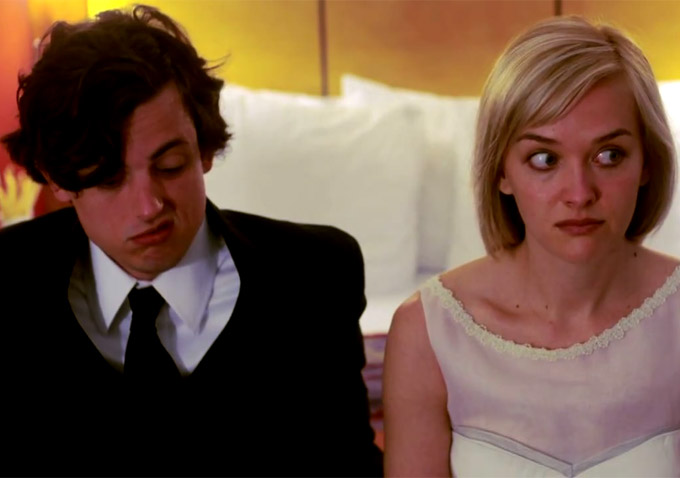 Bob Byington’s “Somebody Up There Likes Me” is about a guy who doesn’t grow up. In fact, he doesn’t even age over the film’s three-decade span of his life. It may have something to do with a mysterious briefcase, the origins of which are only ever suggested by animated cloud interludes and the ethereal implications of the title itself. But that hardly matters, so long as Max (Keith Poulson) keeps bumbling through marriage, money and mortality.
Bob Byington’s “Somebody Up There Likes Me” is about a guy who doesn’t grow up. In fact, he doesn’t even age over the film’s three-decade span of his life. It may have something to do with a mysterious briefcase, the origins of which are only ever suggested by animated cloud interludes and the ethereal implications of the title itself. But that hardly matters, so long as Max (Keith Poulson) keeps bumbling through marriage, money and mortality.
Max is, at first, a disgruntled waiter at a generic steakhouse alongside best friend/only friend Sal (Nick Offerman). Over time, each man will have affections for new girl Lyla (Jess Weixler), but the freshly divorced Max gets there first – in fact, he impulsively proposes to the mealy-mouthed breadstick-muncher not long after they meet and she nonchalantly accepts.

Writer-director Byington then takes one of several five-year leaps forward into the narrative. Max and Lyla have a child, unchanging in his cap-and-glasses appearance and ultimately played by Jonathan Togo in his adult years. A financial windfall sees the couple inviting Sal to live with them; he falls for Lyla while Max falls for their son’s nanny, Clarissa (Stephanie Hunt). Our generally apathetic protagonist lucks his way into success and out of adult responsibility, while relationships all around him dissolve and intertwine with little dramatic consequence.
The pervasive passivity of these long-spanning interactions falls right in line with the droll-but-not-twee tone of Byington’s screenplay and direction. Each scene is a brisk vignette of deadpan reversal, often involving a running theme of miscommunication. Max asks Lyla if she’s gotten a raise, she hears him say “raisins”; he gets taken to task by customers and friends alike for his casual use of “you guys,” and he eventually comes to chastise the patrons of his own business. Among the supporting players are Marshall Bell (as Lyla’s father), Megan Mullally (Max’s therapist) and Kevin Corrigan (a stranger whose gesture of grief Max unwittingly exploits), and each serves the distinctly dry humor well in their few scenes.

It would all be for naught if mainstays Poulson, Weixler and Offerman didn’t ease viewers into the quietly odd realm of the film. The latter two are only aged through changes in hair, facial or otherwise, and increasingly mature demeanors (well, maybe Sal writing “Just Divorced” on his rear windshield doesn’t exactly qualify). Poulson, though, remains unchanging as life passes him by, and the lanky leading man maintains a precise level of flippancy that defines his every scene and keeps the comedy overall from drifting towards a more exhaustively glib end of the spectrum.
Like our not-quite-hero, “Somebody Up There Likes Me” walks a fine line between casual cruelty and the grander schemes of time, evoking recent festival favorites “The Happy Poet” and “You Hurt My Feelings” as much as the respectively funnier and farther-reaching likes of “The Jerk” and “Barry Lyndon.” We can’t speak to Byington’s earlier films (“Harmony and Me,” “RSO: Registered Sex Offender“), but this one happens to be an odd little keeper. [B]





